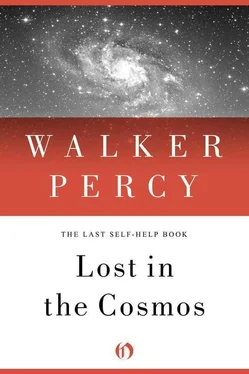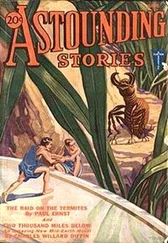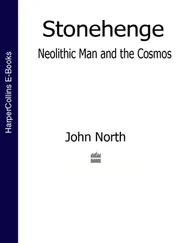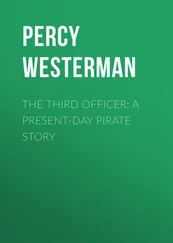So one day you pick up a brochure from a travel agency in Orlando about a thatched-roof-cottage tour of England and a hot-air balloon ride down the Loire Valley and get in your car and start home. From the radio comes news of yet another sinkhole in the fragile limestone crust of central Florida. When you arrive in your block, you discover that your entire lot, house, husband Ralph, and the Zenith Chromacolor have dropped out of sight and disappeared forever into the Eocene muck.
This is
(a) Unrelievedly bad news: Ralph, a good man, a good husband, is gone. You, a good Christian woman, have lost your better half. You are alone in the world.
(b) Putatively bad: This is all true, but on the other hand Ralph is gone through no fault of your own and you are free. Frankly, thirty years of Ralph is enough. Moreover, Ralph was well insured.
(CHECK ONE)
(4) You are picking up the morning paper before going to work. It is a big day in your career. You are making a sales presentation to representatives of the biggest prospective corporate customer in the history of your firm. You’ve been suffering some anxiety and sleepless nights, and with good reason. In recent months you’ve been somewhat depressed and you’re drinking more than you should.
A young insane person, totally unknown to you, drives slowly past your house in an ancient VW, takes aim with his Colt Woodsman.22-caliber pistol, and shoots you in the armpit just as you reach to take the newspaper from the paper-tube.
The wound is probably not fatal. The bullet hits a rib, flattens, ricochets into the substance of your lung, but without injuring heart or major vessel. Your neighbor comes to your aid, calls an ambulance. Feeling faint, you sit on the grass of your front yard. You notice a dogwood tree which you planted ten years ago. It is doing well.
In the emergency room of the hospital, you feel a strange euphoria. You joke with the doctors. Even though you’re spitting blood and growing fainter, your mind works wonderfully well. To the amazement of the doctors and nurses, you remember a remark of Churchill’s, which you quote: “Nothing makes a man feel better than to be shot without effect.”
Is this occurrence
(a) Unrelievedly bad news? It is not good to get shot. One could die of it.
(b) Putatively bad news but secretly good? The incident somehow dispenses you. The single irrational act of a madman changes the entire state of your life in an instant — from that of an anxious worried businessman in danger of losing a big account, to that of an innocent victim, not only not guilty but also unfailed, a patient who finds himself not only in the peculiar role of hospital patient with its peculiar prerogatives, that of being the passive and blameless recipient of the expert services of highly trained people, but of a certain honorific status as well, better than a business bonus: that of being a kind of surrogate victim for all of us. After all, it could happen to any of us in this crazy world, and here it has happened to you, a highly respected and successful member of the community. You took a round which any of us could have taken.
What is more, you’ll probably get the account for your firm — which in your anxiety you might have lost — without lifting a finger. What corporation would turn you down?
Why did President Reagan feel better after he was shot than he has felt since?
(CHECK ONE)
(5) You are standing by your paper-tube in Englewood reading the headlines. Your neighbor comes out to get his paper. You look at him sympathetically. You know he has been having severe chest pains and is facing coronary bypass surgery. But he is not acting like a cardiac patient this morning. Over he jogs in his sweat pants, all smiles. He has triple good news. His chest ailment turned out to be a hiatal hernia, not serious. He’s got a promotion and is moving to Greenwich, where he can keep his boat in the water rather than on a trailer.
“Great, Charlie! I’m really happy for you.”
Are you happy for him?
(a) Yes. Unrelievedly good news. Surely it is good news all around that Charlie is alive and well and not dead or invalided. Surely, too, it is good for him and not bad for you if he also moves up in the world, buys a house in Greenwich where he can keep a 25-foot sloop moored in the Sound rather than a 12-foot Mayflower on a trailer in the garage in Englewood.
(b) Putatively good news but — but what? But the trouble is, it is good news for Charlie, but you don’t feel so good.
(CHECK ONE)
If your answer is (b), could you specify your dissatisfaction, i.e., do the following thought experiment: which of the following news vis-à-vis Charlie and you at the paper-tube would make you feel better:
(1) Charlie is dead.
(2) Charlie has undergone a quadruple coronary bypass and may not make it.
(3) Charlie does not have heart trouble but he did not get his promotion or his house in Greenwich.
(4) Charlie does not have heart trouble and did get his promotion but can’t afford to move to Greenwich.
(5) You, too, have received triple good news, so both of you can celebrate.
(6) You have not received good news, but just after hearing Charlie’s triple good news, you catch sight of a garbage truck out of control and headed straight for Charlie — whose life you save by throwing a body block that knocks him behind a tree. (Why does it make you feel better to save Charlie’s life and thus turn his triple good news into quadruple good fortune?)
(7) You have not received good news, but just after you hear Charlie’s triple good news, an earthquake levels Manhattan. There the two of you stand, gazing bemused at the ruins across the Hudson from Englewood Cliffs.
(CHECK ONE)
In a word, how much good news about Charlie can you tolerate without compensatory catastrophes, heroic rescues, and such?
(6) On the station platform, a fellow commuter, a stranger to you these past six years, approaches you and tells you of the news bulletin he has just picked up from his Sony Mystereo. Not Manhattan but San Francisco has at last suffered the long-awaited major earthquake, magnitude 8.3 Richter. Casualties are estimated at near two hundred thousand.
(a) Unrelievedly bad news? How can there be anything good in such massive suffering and loss of life?
(b) Putatively bad news? Else why is your fellow commuter so excited that, even as he shakes his head dolefully, his earphones come loose? Does he take comfort in what he does not say but perhaps thinks, that it is Gomorrah getting its due, what with the gays, creeps, and deviates who must comprise at least half the casualties?
(CHECK ONE)
(7) You are an astronomer, starship designer, TV personality. You write about the Cosmos. You live next door to another astronomer, starship designer, TV personality. He also writes about the Cosmos. You both are employed by the Jet Propulsion Laboratory in Pasadena, not so much for your scientific abilities as for your PR value and your skill at popularizing science. You both have written best-sellers about space travel, ETIs (extraterrestrial intelligences), the necessity for nuclear disarmament, and so on. You are both aware that man might well destroy himself and the earth before he can explore the Cosmos and establish communication with other civilizations. There is a friendly rivalry between you. You two have different solutions to man’s problems with himself.
You believe that wars are the consequences of sexually repressive societies, especially Christian. You have evidence that in more primitive societies, where sexual freedom is encouraged among both the young and adults, where there is an uninhibited display of affection and sexual contact, there are few if any wars. Your all-time favorite book is Coming of Age in Samoa. Your own latest book, Space and Sexuality, a best-seller, advances a proposal to create just such a society in miniature, a small community which is not only scientifically advanced but also loving and sexually unrepressed. Toward this end, you have designed a starship adapted from the Bussard fusion ramjet, which will accommodate a crew of ten (five men and five women), chosen not only for their technological skills but also for their freedom from sexual hang-ups, for a journey of several years to the vicinity of Alpha Centauri. The starship has already been jokingly nicknamed the Love Boat by your colleagues. But in all seriousness, you propose that NASA initiate a crash program to launch the ship before what you are almost certain will be the last war on earth.
Читать дальше












